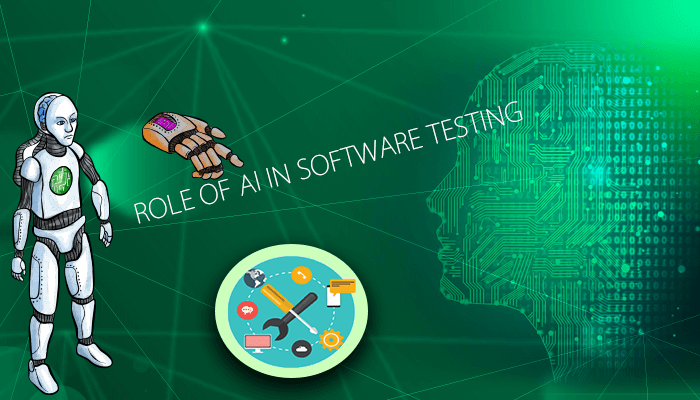The Role of AI In Software Testing
According to Gartner, by 2020, AI technologies will be pervasive in almost every new product and service and will also be a top investment priority for CIO's. 2018 really was all about Artificial Intelligence. Tech giants such as Microsoft, Facebook, Google, Amazon and the like spent billions on their AI initiatives. We started noticing the rise of AI as an enterprise technology. It's now clear how AI brings new intelligence to everything it touches by exploiting the vast sea of data at hand. Influential voices also started talking about the paradigm shift that this technology would bring to the world of software development. Of course, software testing too has not remained immune to the charms of AI.

Role: AI In Software Testing.
But first, Why do we Need AI for Software Testing?
It seems like we have only just firmly established the role of test automation in the software testing landscape and we must start preparing for further disruptions promised by AI! The rise of test automation was driven by development methodologies such as Agile and the need to ship bug and error-free, robust software products into the market faster. From there we have progressed into the era of daily deployments with the rise of DevOps. DevOps is pushing organizations to accelerate the QA cycle even further, to reduce test overheads, and to enable superior governance. Automating test requirement traceability and versioning are also factors that now need careful consideration in this new development environment.
The 'surface area' of testing has also increased considerably. As applications interact with one another through API's leveraging legacy systems, the complexity tends to increase as the code suites keep growing. As the software economy grows and enterprises push towards digital transformation, businesses now demand real-time risk assessment across the different stages of the software delivery cycle.
The use of AI in software testing could emerge as a response to these changing times and environments. AI could help in developing failsafe applications and to enable greater automation in testing to meet these expanded expectations from testing.
How will AI work in Software Testing?
As we move deeper into the age of digital disruption, the traditional ways of developing and delivering software are inadequate to fuel innovation. Delivery timelines are reducing but the technical complexity is rising. With Continuous Testing gradually becoming the norm, organizations are trying to further accelerate the testing process to bridge the chasm between development, testing, and operations in the DevOps environment.
- AI helps organizations achieve this pace of accelerated testing and helps them test smarter and not harder. AI has been called, 'A field of study that gives computers the ability to learn without being explicitly programmed'. This being the case, organizations can leverage AI to drive automaton by leveraging both supervised and unsupervised methods.
- An AI-powered testing platform can easily recognize changed controls promptly. The constant updates in the algorithms will ensure that even the slightest changes can be identified easily.
- AI in test automation can be employed for object application categorizations for all user interfaces very effectively. Upon observing the hierarchy of controls, testers can create AI enabled technical maps that look at the graphical user interface (GUI) and easily obtain the labels for different controls.
- AI can also be employed effectively to conduct exploratory testing within the testing suite. Risk preferences can be assigned, monitored, and categorized easily with AI. It can help testers in creating the right heat maps to identify bottlenecks in processes and help in increasing test accuracy.
- AI can be leveraged effectively to identify behavioral patterns in application testing, defect analysis, non-functional analytics, analysis data from social media, estimation, and efficiency analysis. Machine Learning, a part of AI, algorithms can be employed to test programs and to generate robust test data and deep insights, making the testing process more in-depth and accurate.
- AI can also increase the overall test coverage and the depth and the scope of the tests as well. AI algorithms in software testing can be put to work for test suite optimization, enhancing UI testing, traceability, defect analysis, predicting the next test for queuing, determine pass/fail outcomes for complex and subjective tests, rapid impact analysis etc. Since 80% of all tests are repetitive, AI can free up the tester's time and helps them focus on the more creative side of testing.
Conclusion:
Perhaps the ultimate objective of using AI in software testing is to aim for a world where the software will be able to test, diagnose, and self-correct. This could enable quality engineering and could further reduce the testing time from days to mere hours. There are signs that the use of AI in software testing can save time, money, and resources and help the testers focus their attention on doing the one thing that matters — release great software.
Share This Article:







